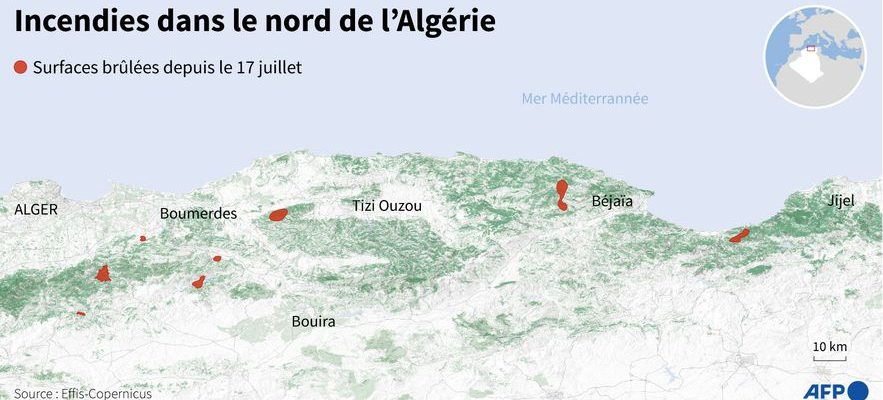Greece, Italy and Spain are suffocating and continue to battle fires. Further south, part of the Maghreb – particularly Algeria and Tunisia – is also facing an unprecedented heat wave and very intense fires.
At least 34 people, including ten soldiers, died in violent fires in northeastern Algeria, according to a new report published by the Interior Ministry on Monday evening. Algerian President Abdelmadjid Tebboune sent his condolences to the families, referring to “civilian victims” but also “military”. The Express make the point.
What happened in Algeria?
About fifteen wilayas (prefectures) in the northeast of the country were affected by fires. Soldiers found themselves surrounded by flames as they were evacuated from Beni Ksila, in the eastern Béjaïa prefecture, accompanied by residents of neighboring hamlets, the Ministry of Defense said.
Between Sunday and Monday, Algeria recorded 97 fire starts in 16 prefectures but the most violent fires affected Béjaïa, Bouira and Jijel, according to the Interior Ministry. Driven by very strong winds, they reached residential areas in these three prefectures where 1,500 people threatened by the flames were evacuated.
Local media images show burning fields and wooded areas, charred cars and burnt-out storefronts in villages completely destroyed by the flames.
The authorities remain on alert, with peaks of up to 48 degrees locally in five eastern prefectures: Jijel, Skikda, Annaba, El Tarf and Guelma, placed in “orange vigilance”.
Fires in Algeria.
© / AFP
What happened in Tunisia?
The mercury hovered around 50 degrees in Tunisia on Monday, 6 to 10 degrees above normal for the season, which caused power outages and forced many residents to seek refuge on the coast or beaches, even at night.
On Monday, in downtown Tunis, the temperature soared to a peak of 49 degrees in the shade. A screen on Avenue Bourguiba, the central axis of the capital, even showed 56 degrees in the sun at midday.
In the border area of Tabarka, in the North-West, serious fires resumed on Monday near an area already ravaged by flames the previous week. Significant damage is to be reported near Nefza, 150 km west of Tunis, where helicopters and Canadair water bombers intervened.
“About 300 inhabitants of the village of Melloula were evacuated by sea” as a precaution against strong gusts of wind fanning the fires, according to Houcem Eddine Jebabli, spokesperson for the Tunisian National Guard, who also mentioned many departures by land. “They were transferred to reception centers in Tabarka or housed with relatives,” said Moez Triaa, spokesperson for Civil Protection.
Why is the heat wave phenomenon so intense?
In both countries, these fires have originated from overheated vegetation deprived of water for weeks. Every summer, the north and east of Algeria are hit by forest, maquis and crop fires, a phenomenon that is increasing year by year under the effect of climate change, resulting in droughts and heat waves. In August 2022, gigantic fires killed 37 people in the El Tarf region, in the Northeast.
The summer of 2021 had been the deadliest in decades: more than 90 people had died in fires that devastated the north, in particular Kabylia.
What consequences for the population?
These abnormally high temperatures for the month of July have caused power cuts in recent days in Tunisia. The public company Steg explained that it had decided to preserve the performance of the network. These load shedding takes place for half an hour to an hour, in particular at times of high consumption. On July 10, a record electricity consumption was reached at 4,692 megawatts, due to intensive use of air conditioning. Tunisians from working-class neighborhoods, often without air conditioning, come in the evening to sleep in tents on the beaches of Carthage or La Marsa, north of Tunis. On social networks, many Tunisians are ironic about the heat peak expected on Monday, comparing Tunisia to a “kanoun”, a traditional brazier. Others have posted prayers for the heat wave that has lasted more than two weeks to end.
In Algeria, plunged into an “unprecedented heat wave”, the public energy group Sonelgaz said it recorded a peak in consumption of 18,697 megawatts on Sunday. Air conditioners have become overpriced (more than 500 euros against 300 previously) or impossible to find.
Elsewhere in the Maghreb, Morocco and Libya, temperatures were more in line with seasonal norms.
